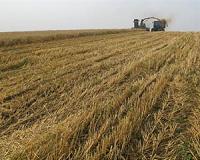 |
Cairo (UPI) Mar 11, 2011 The wave of political upheaval engulfing the Arab world was unleashed in large part because of high food prices in countries that depend on imports to feed burgeoning populations. But as imports swell, new crises are on their way. "For decades the agricultural policy of the Middle East and North Africa has been extremely simple: hydrocarbon exports pay for carbohydrate imports," observed commodities expert Javier Blas of the Financial Times. "As social and political unrest sweeps the region, the policy has two implications for commodities markets: countries will try everything to maintain high oil prices and will hoard food supplies, which will push agricultural costs higher," Blas wrote. "This bargain -- providing the world with oil and gas in return for cereals -- is clear in a country such as Libya, which is one of the world's largest wheat importers per capita, as it is in Algeria and Saudi Arabia." This dependence on imported food isn't likely to change anytime soon, analysts say. The regional states have little arable land and even less water and worsening climate change will make their situation even more precarious. Some experts question the extent to which rising food prices was behind the uprisings in Tunisia and Egypt, although like World Bank President Robert Zoellick, they acknowledge they were "an aggravating factor." But even if that is so, spiraling food prices are likely to ignite further trouble in the months ahead because, as the International Institute for Strategic Studies in London observes, surging wheat and other commodity prices "are creating a global headache." Much of this was due to bad weather -- climate change, again -- ruining crops. In February, wheat traded at $8.50-$9 a bushel, compared to $4 in July 2010. "The stage was set when record spring rainfall in Canada, the world's second largest wheat exporter after the United States, cut that country's harvest by nearly a quarter," the IISS reported in a March 2 analysis. "Then drought beset Russia, Ukraine and Kazakhstan. Bushfires across Russia slashed the yearly wheat harvest to approximately 60 million tons, down from 97 million tons in 2009. "Russia, the world's fourth largest wheat exporter, accounting for roughly 14 percent of the global wheat trade, responded by imposing an export ban on wheat, barley and rye from August," the think tank said. According to International Grains Council statistics, Egypt, Russia's largest customer, received 1.6 million tons from Russia in the second half of 2010, compared to 2.8 million tons in the equivalent period in 2009. Similar crop failures occurred in China and the United States, Latin America and Australia. "Overall, U.S. Department of Agriculture forecasts that 2010-11 wheat production, at 645 million tons, will fall below consumption, at 655 million tons, forcing the world to dip into existing 177 million ton inventories," the IISS reported. Observing that growth in agricultural productivity has been declining steadily since the mid-1990s, the London think tank said that increasing scarcity of farmland and water "has been adding to supply-side stresses. "Unfavorable weather presents a continual risk and the impact of longer-term climate change is still unknown," it noted. Some Middle Eastern states have been making major purchases in recent months, among them 2.9 million tons of U.S. wheat by Egypt, 295 million tons by Algeria, with Jordan, Lebanon, Libya, Morocco and Turkey also making hefty buys. The United Nations' Food and Agricultural Organization estimates that over the last decade global food prices have risen an average 83 percent. With another multiyear surge in food prices likely, the FAO's senior economist, Abdolreza Abbassian, predicts "we are two bad seasons from a major disaster." The steady rise in oil prices, spurred in recent weeks by the civil war raging in Libya and fears the Arab unrest will erupt in major oil producers like Saudi Arabia and Kuwait, has helped push up food prices by increasing the costs of transportation and fertilizers. With the Middle Eastern countries "facing dearer food -- and a higher bill for subsidies -- they will have every incentive to keep oil prices high too," Blas observed. "The Middle East and North Africa is facing a political crisis that for the rest of the world constitutes an inflationary threat."
Share This Article With Planet Earth
Related Links Farming Today - Suppliers and Technology
 Study Shows No-Till's Benefits For Pacific Northwest Wheat Growers
Study Shows No-Till's Benefits For Pacific Northwest Wheat GrowersWashington DC (SPX) Mar 11, 2011 Wheat farmers in eastern Oregon and Washington who use no-till production systems can substantially stem soil erosion and enhance efforts to protect water quality, according to research by U.S. Department of Agriculture (USDA) scientists. Agricultural Research Service (ARS) hydrologist John Williams led a study that compared runoff, soil erosion and crop yields in a conventional, intensive ... read more |
|
| The content herein, unless otherwise known to be public domain, are Copyright 1995-2010 - SpaceDaily. AFP and UPI Wire Stories are copyright Agence France-Presse and United Press International. ESA Portal Reports are copyright European Space Agency. All NASA sourced material is public domain. Additional copyrights may apply in whole or part to other bona fide parties. Advertising does not imply endorsement,agreement or approval of any opinions, statements or information provided by SpaceDaily on any Web page published or hosted by SpaceDaily. Privacy Statement |